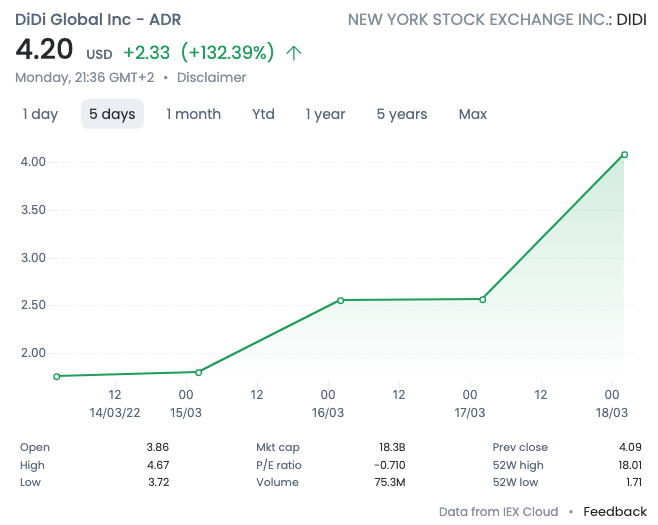Last year, July 2021, China's answer to Uber, DiDi Global, listed on the New York Stock Exchange .
That IPO based 288 million American Depository Shares (ADS) at US$14 apiece gave DiDi a valuation of +/– US $73 billion and effectively put it in the same ballpark as their global competitor, Uber.
(Actually, DiDi stole the idea from Uber, but then so did Estonia's Bolt; kind of like Google stole the smartphone idea from Apple. But I digress…)
In the six months to that, there were 29 IPOs by Chinese companies in the US. Which raised US$7.6 billion.
Last Friday, 18 March 2022, DiDi Global's shares jumped 54%. (Yes, 54%, that's not a typo.)
Shares of most Chinese companies jumped on that day. Bilibili, the gaming-focused video sharing ecosystem more familiarly known as B Site, was trading up 21%, Jingdong, a.k.a. JD.com, was up 9% etc. etc.
(Yes, I know Alibaba was up 10% too. Sit down…)
Now before you go rushing off to buy US listed shares of China companies, I need you to pay attention.
Chinese companies are talking about delisting from US stock market.
DiDi announced December last year it would commence the process of removing its stock from the NYSE for a listing in Hong Kong.
The company issued a one line statement in Mandarin on its official Weibo account which translated as after careful study, the company will start the work of delisting from NYSE and initiate preparation for listing in Hong Kong with immediate effect.
Consider that since Alibaba's IPO in 2014 which raised US $25 billion, 282 other companies have listed on US exchanges with a market cap in October last year of US $1,7 trillion.
Now depending on who you ask, there are various narratives at play as to why this is happening.
The US narrative is that this is happening because the Securities and Exchange Commission has put in place audit requirements, which Chinese companies are not complying with.
Five companies were named by the SEC earlier this month including fast-food company Yum China Holdings, tech firm ACM Research, biotech group BeiGene, Zai Lab, and pharmaceutical company Hutchmed.
(Yum China, controls KFC, Taco Bell and Pizza Hut in China.)
The China narrative is that China asked Didi to delist from the US on Security Fears . A Bloomberg report said:
Didi sparked the ire of Beijing when it proceeded with its New York stock offering this summer, despite regulatory requests that it ensure the security of its data before the IPO.
Chinese regulators quickly launched multiple investigations into the company and have considered a range of unprecedented penalties.
Of course none of this is going to happen immediately. The SEC has a three year window before it can act on delisting.
But investors are taking the matter seriously. (Barron's has a primer on the subject: " What Happens When Stocks Delist? What to Know if You Own DiDi .")
My take on what's going on is quite simple: I believe China doesn't trust the US.
The haste with which the US has seized Russia's assets after unilaterally imposing sanctions is probably making every country sit up and take notice.
If I were China sitting with $1,7 trillion in assets in the US right now, I would be getting my money out sooner rather than later.
(Especially if I'm thinking about invading an island in the South China Sea sometime in the near future…)

